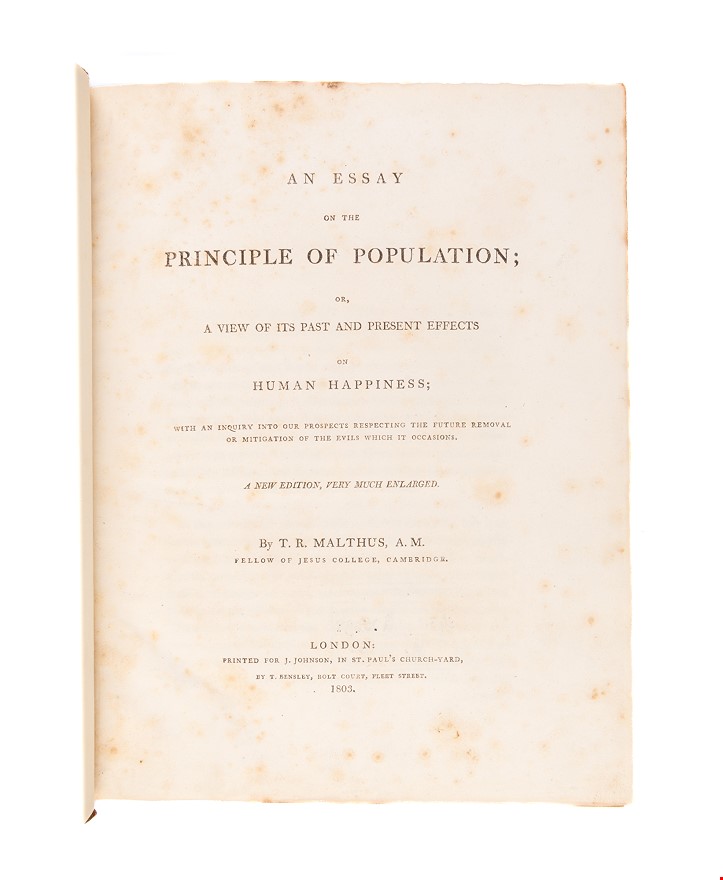An Essay on the Principle of Population; or, A View of its Past and Present Effects on Human Happiness; with an Inquiry into our Prospects Respecting the Future Removal or Mitigation of the Evils which it Occasions. A New Edition, Very Much Enlarged.
MALTHUS Thomas Robert (1803.)
£6000.00
Please contact us in advance if you would like to view this book at our Curzon Street shop.
THE 'GREAT QUARTO' IN A STRIKING CONTEMPORARY BINDING
Second edition. 4to. viii, [4], 610 pp. Contemporary russia, spine with four single raised bands detailed in blind and outlined with gilt rules, gilt lettering to second panel and at foot, the rest with elaborate gilt lattice work, covers with large spot-marbled paper inset panels within two gilt-tooled borders and an elaborate blind roll-tooled border (title page and terminal leaf slightly foxed, spotting to edges of text block and occasionally foxing throughout, small rubberstamp 'ST' to front pastedown, small area of faint residue from removal of old label to rear pastedown, small library ink stamp to blank verso of title, tear with some small loss to lower corner pp. 89-90 from printing defect, not effecting text, creasing to pp. 267-70 and pp. 597-98; headcap worn, joints just starting to split but holding firmly, boards heavily worn along the edges, lower corners bumped). London, J. Johnson.
The 'Great Quarto' edition of Malthus's canonical text of classical economics - in a striking contemporary binding - notionally the second edition of the Essay on Population published anonymously in 1798, but so substantially enlarged, rewritten, and re-titled as to be a new book.
Malthus's Essay "was originally the product of a discussion with his father on the perfectibility of society. Malthus senior was a supporter of the utopian views of Godwin and others, but recognised the force of his son's refutation of these views, and urged him to publish. Thus, the first edition was essentially a fighting tract, but later editions were considerably altered and grew bulkier as Malthus defended his views against a host of critics. The Malthusian theory of population came at the right time to harden the existing feeling against the Poor Laws and Malthus was a leading spirit behind the Poor Law Amendment Act of 1834" (Printing and the Mind of Man).
"In 1803 Malthus published a greatly expanded second edition of the Essay, incorporating details of the population checks that had been in operation in many different countries and periods. He did not claim originality for the idea that population tends to outrun the food supply. In the preface to the second edition he stated that in writing the first edition he had deduced the principle of population from the writings of David Hume, Robert Wallace, Adam Smith, and Richard Price, but that in the intervening period he had become aware that much more had been published on the subject. He nevertheless believed that even more remained to be done, especially in describing the means by which populations are checked and in drawing out the practical implications of the principle of population. In the second edition, he made clear what was only implicit in the first, that prudential restraint should, if humanly possible, be 'moral restraint' - that is, delayed marriage accompanied by strictly moral pre-marital behaviour, although he admitted that moral restraint would not be easy and that there would be occasional failures. Whereas in the first edition he had said that all the checks to population would involve either misery or vice, in the second edition he attempted to lighten this 'melancholy hue' and 'to soften some of the harshest conclusions of the first essay' by arguing that moral restraint, if supported by an education emphasising the immorality of bringing children into the world without the means of supporting them, would tend to increase rather than diminish individual happiness" (ODNB).
PMM, 251 (first edition); Goldsmiths', 18640; Kress, B.4701; Einaudi, 3668..
Stock Code: 245465






